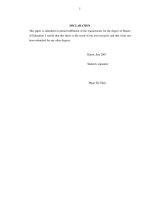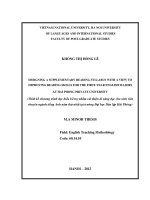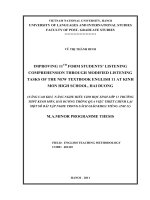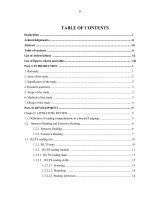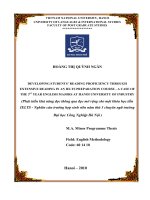Developing students' reading proficiency through extensive reading in an IELTS prepation course - A case of the 3rd year English majors at Hanoi University of I20150227
Bạn đang xem bản rút gọn của tài liệu. Xem và tải ngay bản đầy đủ của tài liệu tại đây (838.22 KB, 7 trang )
VIETNAM NATIONAL UNIVERSITY, HANOI
UNIVERSITY OF LANGUAGES & INTERNATIONAL STUDIES
FACULTY OF POST GRADUATE STUDIES
*****************
HOÀNG THỊ QUỲNH NGÂN
DEVELOPING STUDENTS’ READING PROFICIENCY THROUGH
EXTENSIVE READING IN AN IELTS PREPARATION COURSE - A CASE OF
THE 3
rd
YEAR ENGLISH MAJORS AT HANOI UNIVERSITY OF INDUSTRY
(Phát triển khả năng đọc thông qua đọc mở rộng cho một khóa học tiền
IELTS - Nghiên cứu trường hợp sinh viên năm thứ 3 chuyên ngữ trường
Đại học Công Nghiệp Hà Nội )
M.A. Minor Programme Thesis
Field: English Methodology
Code: 60 14 10
Hanoi – 2010
VIETNAM NATIONAL UNIVERSITY, HANOI
UNIVERSITY OF LANGUAGES & INTERNATIONAL STUDIES
FACULTY OF POST GRADUATE STUDIES
*****************
HOÀNG THỊ QUỲNH NGÂN
DEVELOPING STUDENTS’ READING PROFICIENCY THROUGH
EXTENSIVE READING IN AN IELTS PREPARATION COURSE - A CASE OF
THE 3
rd
YEAR ENGLISH MAJORS AT HANOI UNIVERSITY OF INDUSTRY
(Phát triển khả năng đọc thông qua đọc mở rộng cho một khóa học tiền
IELTS - Nghiên cứu trường hợp sinh viên năm thứ 3 chuyên ngữ trường
Đại học Công Nghiệp Hà Nội )
M.A. Minor Programme Thesis
Field: English Methodology
Code: 60 14 10
Supervisor: Dr. Dương Thị Nụ
Hanoi – 2010
iv
TABLE OF CONTENTS
Declaration i
Acknowledgements ii
Abstract iii
Table of contents iv
List of Abbreviations vii
List of figures, charts and tables viii
Part I. INTRODUCTION 1
1. Rationale 1
2. Aims of the study 2
3. Significance of the study 2
4. Research questions 3
5. Scope of the study 3
6. Methods of the study 3
7. Design of the study 4
Part II. DEVELOPMENT 5
Chapter I: LITERATURE REVIEW 5
1.1. Definition of reading comprehension in a Second Language 5
1.2. Intensive Reading and Extensive Reading 6
1.2.1. Intensive Reading 6
1.2.2. Extensive Reading 7
1.3 IELTS reading test 10
1.3.1. IELTS tests 10
1.3.2. IELTS reading module 11
1.3.2.1. IELTS reading tasks 11
1.3.2.2. IELTS reading skills 12
1.3.2.2.1. Scanning 13
1.3.2.2.2. Skimming 14
1.3.2.2.3. Making inferences 14
v
1.4. Extensive Reading and IELTS reading test 15
1.5. Reading Proficiency 16
Chapter II: METHODOLOGY 17
2.1. Rationale for using experimental method 17
2.2. Variables 17
2.3. Participants 17
2.4. Pretest and Posttest……………………………………………… 18
2.5. The extensive reading program…………………………………………………… 19
2.5.1. Reading materials…………………………………………………… 20
2.5.2. Syllabus and activities…………………………………………………… 21
2.6. Procedures……………………………………………………………………… 24
Chapter III: FINDINGS…………………………………………………………… 25
3.1. Comparison of experimental and control groups’ reading proficiency after the extensive
reading program…………………………………………………… 25
3.1.1. The results of experimental and control groups in the pre-test and post – test 25
3.1.2. Mean gains of experimental and control groups … ………… 26
3.2. Surveyed students’ opinions on extensive reading for pre-IELTS course 27
3.2.1 The students’ difficulties in reading IELTS reading texts 27
3.2.2. Experimental subjects’ attitudes towards extensive reading in the pre-IELTS
course 28
3.2.3. Students’ suggestions for the extensive reading in pre-IELTS course 29
Chapter IV: IMPLICATIONS 31
4.1. Research implications 31
4.2. Suggestions on the implementation of extensive reading in pre-IELTS class 32
4.2.1. Grouping and instructing 33
4.2.2. Preparations and Presentation procedures…………………………… 35
Part III. CONCLUSIONS 37
1. Conclusions 37
vi
2. Limitations of the study 37
3. Recommendation for further research 38
REFERENCES 39
APPENDICES I
Appendix 1: The pretest I
Appendix 2: The post test………………………………………………………………… VIII
Appendix 3: Answer to the pretest and Answer to the posttest………………… …… XIV
Appendix 4: The students’ results in the pre-test, post – test and gain….………………….XV
Appendix 5: The post- program questionnaire………………………………………… XVI
Appendix 5: Sample Reading………………………………………………………… …XVII
Appendix 6: Sample
Report… ……………………………………………………… XVIII
Appendix 7: Sample Reflection………………………………………………… ……… XIX
iii
ABSTRACT
we ourselves are fully aware of the essential role that reading plays in the students’
performances as well as objectives they necessarily set for the subject. Extensive reading has
been widely known to have positive effects on students’ language ability in general and
reading proficiency in particular. English majors in our university, Hanoi University of
Industry (HaUI), seem not very active in learning IELTS reading though it has been so far
utilized to assess the academic achievement of the students. On the basis of those evidences,
we have come up with an idea that extensive reading activities in class should be introduced to
students with the aim to arousing their active attitudes towards reading as well as bettering
their ability when dealing with the skill in the IELTS tests. This prediction was tested by
comparing the reading proficiency achieved by 30 students who had participated in an
extensive reading program for a semester, i.e three months and that by other 30 students who
had just followed the traditional reading program. All the participants were third year English
major students at Hanoi University of Industry. To make the findings more persuasive, the
results of the questionnaire that followed the extensive reading program revealed the students’
opinions on the difficulties they have to deal with, their attitudes towards extensive reading in
the pre-IELTS course and their suggestions for more effective extensive reading in pre-IELTS
course. The results of this study support the conclusion that the extensive reading program is
beneficial to students and has positive effects on students’ reading proficiency in pre-IELTS
course and recommend the broad application of the extensive reading approach of similar
programs in the future.
PDF Merger
Thank you for evaluating AnyBizSoft PDF
Merger! To remove this page, please
register your program!
Go to Purchase Now>>
Merge multiple PDF files into one
Select page range of PDF to merge
Select specific page(s) to merge
Extract page(s) from different PDF
files and merge into one
AnyBizSoft


